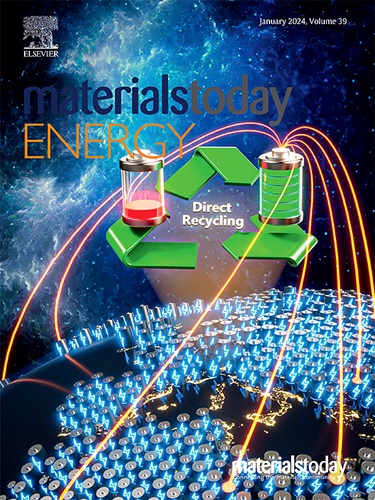Meliorative dielectric properties in core@double-shell structured Al@Al2O3@PDA/PVDF nanocomposites via decoupling the intra-particle polarization and inter-particle polarization
IF 8.6
2区 材料科学
Q1 CHEMISTRY, PHYSICAL
引用次数: 0
Abstract
Percolating polymeric composites present enormous potential owing to high dielectric constant () which can be realized near the percolation threshold, but the accompanied large loss forbids their extensive use in practice. Great efforts have been devoted to coating conductive particles with an insulating shell for constrained dielectric loss, yet they markedly reduce . In this work, we explore the poly(vinylidene fluoride, PVDF) composites with a serial of core@double-shell Al@AlO@PDA (polydopamine) nanoparticles with various PDA shell thicknesses. It reveals that the high of the nanocomposites results from a fast intra-particle polarization and a slow inter-particle polarization. The formation of double-shell enables the independent control of the two polarizations always coupled in traditional percolating composites. Through facilitating intra-particle polarization and repressing inter-particle polarization, the Al@AlO@PDA/PVDF can achieve a much higher and lower dielectric loss simultaneously, far exceeding the unmodified Al@AlO/PVDF. Moreover, the calculated activation energy of carrier migration in the Al@AlO@PDA/PVDF is obviously higher than that in untreated nanocomposites, indicating enhanced charge-trapping capability in the core@double-shell nanofillers composites. This core@double-shell strategy offers a new paradigm for the design and preparation of percolating composites with desirable dielectric performances.通过解耦粒子内极化和粒子间极化,改善核@双壳结构 Al@Al2O3@PDA/PVDF 纳米复合材料的介电性能
渗流聚合物复合材料具有高介电常数(),可以在接近渗流阈值时实现,因此具有巨大的潜力,但随之而来的巨大损耗使其无法在实践中广泛使用。为了限制介电损耗,人们一直在努力给导电粒子涂上一层绝缘壳,但这明显降低了......。在这项工作中,我们探索了不同 PDA 外壳厚度的系列核@双壳 Al@AlO@PDA(聚多巴胺)纳米粒子与聚(偏二氟乙烯)PVDF 复合材料。研究结果表明,纳米复合材料的高度是由快速的粒子内极化和缓慢的粒子间极化产生的。双壳的形成使传统渗滤复合材料中始终耦合的两种极化得以独立控制。通过促进粒子内极化和抑制粒子间极化,Al@AlO@PDA/PVDF 可同时获得更高和更低的介电损耗,远远超过未改性的 Al@AlO/PVDF。此外,计算得出的 Al@AlO@PDA/PVDF 中载流子迁移的活化能明显高于未处理的纳米复合材料,这表明芯@双壳纳米填料复合材料的电荷捕获能力增强。这种芯@双壳策略为设计和制备具有理想介电性能的渗流复合材料提供了一种新的范例。
本文章由计算机程序翻译,如有差异,请以英文原文为准。
求助全文
约1分钟内获得全文
求助全文
来源期刊

Materials Today Energy
Materials Science-Materials Science (miscellaneous)
CiteScore
15.10
自引率
7.50%
发文量
291
审稿时长
15 days
期刊介绍:
Materials Today Energy is a multi-disciplinary, rapid-publication journal focused on all aspects of materials for energy.
Materials Today Energy provides a forum for the discussion of high quality research that is helping define the inclusive, growing field of energy materials.
Part of the Materials Today family, Materials Today Energy offers authors rigorous peer review, rapid decisions, and high visibility. The editors welcome comprehensive articles, short communications and reviews on both theoretical and experimental work in relation to energy harvesting, conversion, storage and distribution, on topics including but not limited to:
-Solar energy conversion
-Hydrogen generation
-Photocatalysis
-Thermoelectric materials and devices
-Materials for nuclear energy applications
-Materials for Energy Storage
-Environment protection
-Sustainable and green materials
 求助内容:
求助内容: 应助结果提醒方式:
应助结果提醒方式:


